chapter1简介和翻译标准
CHAPTER 1英文
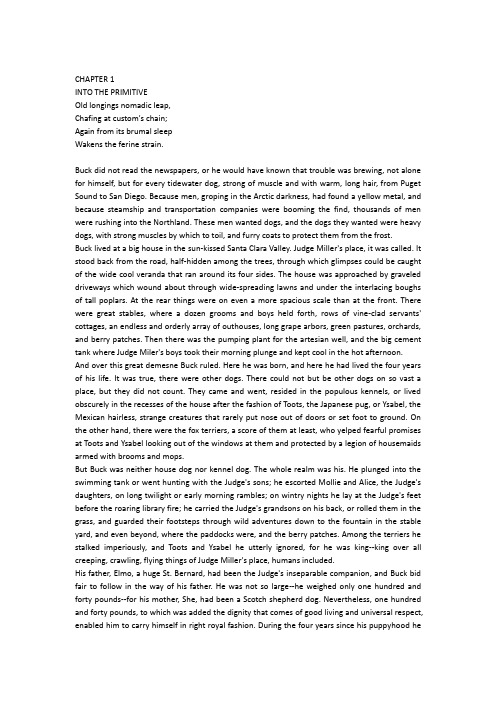
CHAPTER 1INTO THE PRIMITIVEOld longings nomadic leap,Chafing at custom's chain;Again from its brumal sleepWakens the ferine strain.Buck did not read the newspapers, or he would have known that trouble was brewing, not alone for himself, but for every tidewater dog, strong of muscle and with warm, long hair, from Puget Sound to San Diego. Because men, groping in the Arctic darkness, had found a yellow metal, and because steamship and transportation companies were booming the find, thousands of men were rushing into the Northland. These men wanted dogs, and the dogs they wanted were heavy dogs, with strong muscles by which to toil, and furry coats to protect them from the frost.Buck lived at a big house in the sun-kissed Santa Clara Valley. Judge Miller's place, it was called. It stood back from the road, half-hidden among the trees, through which glimpses could be caught of the wide cool veranda that ran around its four sides. The house was approached by graveled driveways which wound about through wide-spreading lawns and under the interlacing boughs of tall poplars. At the rear things were on even a more spacious scale than at the front. There were great stables, where a dozen grooms and boys held forth, rows of vine-clad servants' cottages, an endless and orderly array of outhouses, long grape arbors, green pastures, orchards, and berry patches. Then there was the pumping plant for the artesian well, and the big cement tank where Judge Miler's boys took their morning plunge and kept cool in the hot afternoon. And over this great demesne Buck ruled. Here he was born, and here he had lived the four years of his life. It was true, there were other dogs. There could not but be other dogs on so vast a place, but they did not count. They came and went, resided in the populous kennels, or lived obscurely in the recesses of the house after the fashion of Toots, the Japanese pug, or Ysabel, the Mexican hairless, strange creatures that rarely put nose out of doors or set foot to ground. On the other hand, there were the fox terriers, a score of them at least, who yelped fearful promises at Toots and Ysabel looking out of the windows at them and protected by a legion of housemaids armed with brooms and mops.But Buck was neither house dog nor kennel dog. The whole realm was his. He plunged into the swimming tank or went hunting with the Judge's sons; he escorted Mollie and Alice, the Judge's daughters, on long twilight or early morning rambles; on wintry nights he lay at the Judge's feet before the roaring library fire; he carried the Judge's grandsons on his back, or rolled them in the grass, and guarded their footsteps through wild adventures down to the fountain in the stable yard, and even beyond, where the paddocks were, and the berry patches. Among the terriers he stalked imperiously, and Toots and Ysabel he utterly ignored, for he was king--king over all creeping, crawling, flying things of Judge Miller's place, humans included.His father, Elmo, a huge St. Bernard, had been the Judge's inseparable companion, and Buck bid fair to follow in the way of his father. He was not so large--he weighed only one hundred and forty pounds--for his mother, She, had been a Scotch shepherd dog. Nevertheless, one hundred and forty pounds, to which was added the dignity that comes of good living and universal respect, enabled him to carry himself in right royal fashion. During the four years since his puppyhood hehad lived the life of a sated aristocrat; he had a fine pride in himself, was even a trifle egotistical, as country gentlemen sometimes become because of their insular situation. But he had saved himself by not becoming a mere pampered house dog. Hunting and kindred outdoor delights had kept down the fat and hardened his muscles; and to him, as to the cold-tubbing races, the love of water had been a tonic and a health preserver.And this was the manner of dog Buck was in the fall of 1897, when the Klondike strike dragged men from all the world into the frozen North. But Buck did not read the newspapers, and he did not know that Manuel, one of the gardener's helpers, was an undesirable acquaintance. Manuel had one besetting sin. He loved to play Chinese lottery. Also, in his gambling, he had one besetting weakness--faith in a system; and this made his damnation certain. For to play a system requires money, while the wages of a gardener's helper do not lap over the needs of a wife and numerous progeny.The Judge was at a meeting of the Raisin Growers' Association, and the boys were busy organizing an athletic club, on the memorable night of Manuel's treachery. No one saw him and Buck go off through the orchard on what Buck imagined was merely a stroll. And with the exception of a solitary man, no one saw them arrive at the little flag station known as College Park. This man talked with Manuel, and money chinked between them."You might wrap up the goods before you deliver them," the stranger said gruffly, and Manuel doubled a piece of stout rope around Buck's neck under the collar."Twist it, and you'll choke him plenty," said Manuel, and the stranger grunted a ready affirmative. Buck had accepted the rope with quiet dignity. To be sure, it was an unwonted performance but he had learned to trust in men he knew, and to give them credit for a wisdom that outreached his own. But when the ends of the rope were placed in the stranger's hands, he growled menacingly. He had merely intimated his displeasure, in his pride believing that to intimate was to command. But to his surprise the rope tightened around his neck, shutting off his breath. In a quick rage he sprang at the man, who met him halfway, grappled him close by the throat, and with a deft twist threw him over on his back. Then the rope tightened mercilessly, while Buck struggled in a fury, his tongue lolling out of his mouth and his great chest panting futilely. Never in all his life had he been so vilely treated, and never in all his life had he been so angry. But his strength ebbed, his eyes glazed, and he knew nothing when the train was flagged and the two men threw him into the baggage car.The next he knew, he was dimly aware that his tongue was hurting and that \he was being jolted along in some kind of a conveyance. The hoarse shriek of a locomotive whistling a crossing told him where he was. He had traveled too often with the Judge not to know the sensation of riding in a baggage car. He opened his eyes, and into them came the unbridled anger of a kidnaped king. The man sprang for his throat, but Buck was too quick for him. His jaws closed on the hand, nor did they relax till his senses were choked out of him once more."Yep, has fits," the man said, hiding his mangled hand from the baggage man, who had been attracted by the sounds of struggle. "I'm taking him up for the boss to 'Frisco. A crack dog doctor there thinks that he can cure him."Concerning that night's ride, the man spoke most eloquently for himself, in a little shed back of a saloon on the San Francisco water front."All I get is fifty for it," he grumbled, "and I wouldn't do it over for a thousand, cold cash."His hand was wrapped in a bloody handkerchief, and the right trouser leg was ripped from kneeto ankle."How much did the other mug get?" the saloon-keeper demanded."A hundred," was the reply. "Wouldn't take a sou less, so help me.""That makes a hundred and fifty," the saloon-keeper calculated, "and he's worth it, or I'm a squarehead."The kidnaper undid the bloody wrappings and looked at his lacerated hand. "If I don't get hydrophobia--""It'll be because you was born to hang," laughed the saloon-keeper. "Here, lend me a hand before you pull your freight," he added.Dazed, suffering intolerable pain from throat and tongue, with the life half throttled out of him, Buck attempted to face his tormentors. But he was thrown down and choked repeatedly, till they succeeded in filing the heavy brass collar from off his neck. Then the rope was removed, and he was flung into a cage-like crate.There he lay for the remainder of the weary night, nursing his wrath and wounded pride. He could not understand what it all meant. What did they want with him, these strange men? Why were they keeping him pent up in this narrow crate? He did not know why, but he felt oppressed by the vague sense of impending calamity. Several times during the night he sprang to his feet when the shed door rattled open, expecting to see the Judge, or the boys at least. But each time it was the bulging face of the saloon-keeper that peered in at him by the sickly light of a tallow candle. And each time the joyful bark that trembled in Buck's throat was twisted into a savage growl.But the saloon-keeper let him alone, and in the morning four men entered and picked up the crate. More tormentors, Buck decided, for they were evil-looking creatures, ragged and unkempt; and he stormed and raged at them through the bars. They only laughed and poked sticks at him, which he promptly assailed with his teeth till he realized that was what they wanted. Whereupon he lay down sullenly and allowed the crate to be lifted into a wagon. Then he, and the crate in which he was imprisoned, began a passage through many hands. Clerks in the express office took charge of him; he was carted about in another wagon; a truck carried him, with an assortment of boxes and parcels, upon a ferry steamer; he was trucked off the steamer into a great railway depot, and finally he was deposited in an express car.For two days and nights this express car was dragged along at the tail of shrieking locomotives; and for two days and nights Buck neither ate nor drank. In his anger he had met the first advances of the express messengers with growls, and they had retaliated by teasing him. When he flung himself against the bars, quivering and frothing, they laughed at him and taunted him. They growled and barked like detestable dogs, mewed, and flapped their arms and crowed. It was all very silly, he knew; but therefore the more outrage to his dignity, and his anger waxed and waxed. He did not mind the hunger so much, but the lack of water caused him severe suffering and fanned his wrath to fever-pitch. For that matter, high-strung and finely sensitive, the ill treatment had flung him into a fever, which was fed by the inflammation of his parched and swollen throat and tongue.He was glad for one thing: the rope was off his neck. That had given them an unfair advantage; but now that it was off, he would show them. They would never get another rope around his neck. Upon that he was resolved. For two days and nights he neither ate nor drank, and during those two days and nights of torment, he accumulated a fund of wrath that boded ill for whoeverfirst fell foul of him. His eyes turned bloodshot, and he was metamorphosed into a raging fiend. So changed was he that the Judge himself would not have recognized him; and the express messengers breathed with relief when they bundled him off the train at Seattle.Four men gingerly carried the crate from the wagon into a small, high-walled back yard. A stout man, with a red sweater that sagged generously at the neck, came out and signed the book for the driver. That was the man, Buck divined, the next tormentor, and he hurled himself savagely against the bars. The man smiled grimly, and brought a hatchet and a club."You ain't going to take him out now?" the driver asked."Sure," the man replied, driving the hatchet into the crate for a pry.There was an instantaneous scattering of the four men who had carried it in, and from safe perches on top the wall they prepared to watch the performance.Buck rushed at the splintering wood, sinking his teeth into it, surging and wrestling with it. Wherever the hatchet fell on the outside, he was there on the inside, snarling and growling, as furiously anxious to get out as the man in the red sweater was calmly intent on getting him out. "Now, you red-eyed devil," he said, when he had made an opening sufficient for the passage of Buck's body. At the same time he dropped the hatchet and shifted the club to his right hand. And Buck was truly a red-eyed devil, as he drew himself together for the spring, hair bristling, mouth foaming, a mad glitter in his bloodshot eyes. Straight at the man he launched his one hundred and forty pounds of fury, surcharged with the pent passion of two days and nights. In mid-air, just as his jaws were about to close on the man, he received a shock that checked his body and brought his teeth together with an agonizing clip. He whirled over, fetching the ground on his back and side. He had never been struck by a club in his life, and did not understand. With a snarl that was part bark and more scream he was again on his feet and launched into the air. And again the shock came and he was brought crushingly to the ground. This time he was aware that it was the club, but His madness knew no caution. A dozen times he charged, and as often the club broke the charge and smashed him down.After a particularly fierce blow he crawled to his feet, too dazed to rush. He staggered limply about, the blood flowing from nose and mouth and ears, his beautiful coat sprayed and flecked with bloody slaver. Then the man advanced and deliberately dealt him a frightful blow on the nose. All the pain he had endured was nothing compared with the exquisite agony of this. With a roar that was almost lion-like in its ferocity, he again hurled himself at the man. But the man, shifting the club from right to left, cooly caught him by the under jaw, at the same time wrenching downward and backward. Buck described a complete circle in the air, and half of another, then crashed to the ground on his head and chest.For the last time he rushed. The man struck the shrewd blow he had purposely withheld for so long, and Buck crumpled up and went down, knocked utterly senseless."He's no slouch at dog-breaking, that's what I say," one of the men on the wall cried with enthusiasm."Druther break cayuses any day, and twice on Sundays," was the reply of the driver, as he climbed on the wagon and started the horses.Buck's senses came back to him, but not his strength. He lay where he had fallen, and from there he watched the man in the red sweater." `Answers to the name of Buck,' " the man soliloquized, quoting from the saloon-keeper's letter which had announced the consignment of the crate and contents. "Well, Buck, my boy," he wenton in a genial voice, "we've had our little ruction, and the best thing we can do is to let it go at that. You've learned your place, and I know mine. Be a good dog and all will go well and the goose hang high. Be a bad dog, and I'll whale the stuffing outa you. Understand?"As he spoke he fearlessly patted the head he had so mercilessly pounded, and though Buck's hair involuntarily bristled at touch of the hand, he endured it without protest. When the man brought him water, he drank eagerly, and later bolted a generous meal of raw meat, chuck by chunk, from the man's hand.He was beaten (he knew that); but he was not broken. He saw, once for all, that he stood no chance against a man with a club. He had learned the lesson, and in all his afterlife he never forgot it. That club was a revelation. It was his introduction to the reign of primitive law, and he met the introduction halfway. The facts of life took on a fiercer aspect; and while he faced that aspect uncowed, he faced it with all the latent cunning of his nature aroused. As the days went by, other dogs came, in crates and at the ends of ropes, some docilely, and some raging and roaring as he had come; and, one and all, he watched them pass under the dominion of the man in the red sweater. Again and again, as he looked at each brutal performance, the lesson was driven home to Buck: a man with a club was a lawgiver, a master to be obeyed, though not necessarily conciliated. Of this last Buck was never guilty, though he did see beaten dogs that fawned upon the man, and wagged their tails, and licked his hand. Also he saw one dog, that would neither conciliate nor obey, finally killed in the struggle for mastery.Now and again men came, strangers, who talked excitedly, wheedlingly, and in all kinds of fashions to the man in the red sweater. And at such times that money passed between them the strangers took one or more of the dogs away with them. Buck wondered where they went, for they never came back; but the fear of the future was strong upon him, and he was glad each time when he was not selected.Yet his time came, in the end, in the form of a little weazened man who spat broken English and many strange and uncouth exclamations which Buck could not understand."Sacredam!" he cried, when his eyes lit upon Buck. "Dat one dam bully dog! Eh? How much?" "Three hundred, and a present at that," was the prompt reply of the man in the red sweater. "And seeing it's government money, you ain't got no kick coming, eh, Perrault?"Perrault grinned. Considering that the price of dogs had been boomed skyward by the unwonted demand, it was not an unfair sum for so fine an animal. The Canadian Government would be no loser, nor would its dispatches travel the slower. Perrault knew dogs, when he looked at Buck he knew that he was one in a thousand--"One in ten thousand," he commented mentally.Buck saw money pass between them, and was not surprised when Curly, a good-natured Newfoundland, and he were led away by the little weazened man. That was the last he saw of the man in the red sweater, and as Curly and he looked at receding Seattle from the deck of the Narwhal, it was the last he saw of the warm Southland. Curly and he were taken below by Perrault and turned over to a black-faced giant called Francois. Perrault was a French Canadian, and swarthy; but Francois was a French Canadian half-breed, and twice as swarthy. They were a new kind of men to Buck (of which he was destined to see many more), and while he developed no affection for them, he none the less grew honestly to respect them. He speedily learned that Perrault and Francois were fair men, calm and impartial in administering justice, and too wise in the way of dogs to be fooled by dogs.In the 'tween-decks of the Narwhal, Buck and Curly joined two other dogs. One of them was a big,snow-white fellow from Spitzbergen who had been brought away by a whaling captain, and who had later accompanied a Geological Survey into the Barrens.He was friendly, in a treacherous sort of way, smiling into one's face the while he meditated some underhand trick, as, for instance, when he stole from Buck's food at the first meal. As Buck sprang to punish him, the lash of Francois's whip sang through the air, reaching the culprit first; and nothing remained to Buck but to recover the bone. That was fair of Francois, he decided, and the half-breed began his rise in Buck's estimation.The other dog made no advances, nor received any; also, he did not attempt to steal from the newcomers. He was a gloomy, morose fellow, ant he showed Curly plainly that all he desired was to be left alone, and further, that there would be trouble if he were not left alone. "Dave" he was called, and he ate and slept, or yawned between times, and took interest in nothing, not even when the Narwhal crossed Queen Charlotte Sound and rolled and pitched and bucked like a thing possessed. When Buck and Curly grew excited, half-wild with fear, he raised his head as though annoyed, favored them with an incurious glance, yawned, and went to sleep again.Day and night the ship throbbed to the tireless pulse of the propeller, and though one day was very like another, it was apparent to Buck that the weather was steadily growing colder. At last, one morning, the propeller was quiet, and the Narwhal was pervaded with an atmosphere of excitement. He felt it, as did the other dogs, and knew that a change was at hand. Francois leashed them and brought them on deck. At the first step upon the cold surface, Buck's feet sank into a white mushy something very like mud. He sprang back with a snort. More of this white stuff was falling through the air. He shook himself, but more of it fell upon him. He sniffed it curiously, then licked some up on his tongue. It bit like fire, and the next instant was gone. This puzzled him. He tried it again, with the same results. The onlookers laughed uproariously, and he felt ashamed, he knew not why, for it was his first snow.IndexNextThis Free Ebook is ProducedBy "Eshu Space".Need More Free Ebooks, Pls Go To/。
3 Jane Eyre第一章六种汉译文
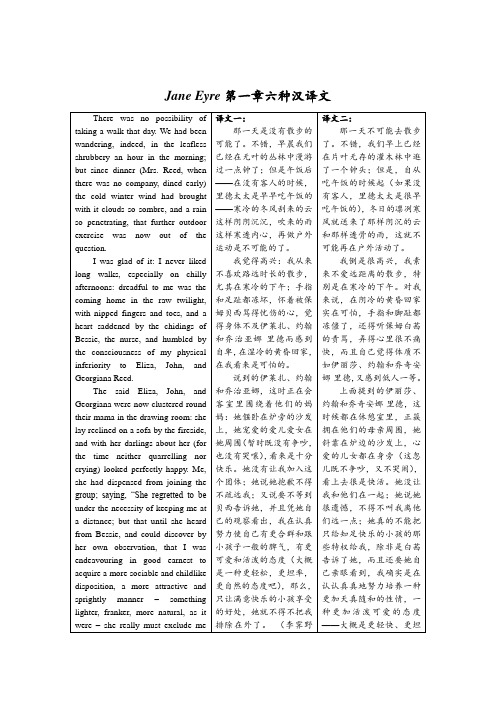
那一天是没有散步的可能了。不错,早晨我们已经在无叶的丛林中漫游过一点钟了;但是午饭后——在没有客人的时候,里德太太是早早吃午饭的——寒冷的冬风刮来的云这样阴阴沉沉,吹来的雨这样寒透内心,再做户外运动是不可能的了。
我觉得高兴:我从来不喜欢路远时长的散步,尤其在寒冷的下午;手指和足趾都冻坏,怀着被保姆贝西骂得忧伤的心,觉得身体不及伊莱扎、约翰和乔治亚娜·里德而感到自卑,在湿冷的黄昏回家,在我看来是可怕的。
说到的以利莎,约翰,和乔治安那,这时正在会客室里围绕着他们的妈妈:她偃卧在炉旁的沙发上,她的爱儿爱女在她周围(暂时既没有争吵,也没有哭嚷),看来是非常快乐。她没有让我加入这个团体,她说她抱歉不得不使我离开;又说要不等到柏茜告诉她,并且凭她自己的观察发现出来,我认真努力使自己有更合群和跟小孩子一般的脾气,有更可爱和活泼的态度——大概是一种更轻快,更坦率,更自然的东西——,那末,仅仅为了想使满意快乐的小孩享受的好处,她就不得不把我除外了。(陈介源译)
上面提到的伊丽莎、约翰和乔奇安娜·里德,这时候都在休憩室里,正簇拥在他们的母亲周围,她斜靠在炉边的沙发上,心爱的儿女都在身旁(这忽儿既不争吵,又不哭闹),看上去很是快活。她没让我和他们在一起;她说她很遗憾,不得不叫我离他们远一点;她真的不能把只给知足快乐的小孩的那些特权给我,除非是白茜告诉了她,而且还要她自己亲眼看到,我确实是在认认真真地努力培养一种更加天真随和的性情,一种更加活泼可爱的态度——大概是更轻快、更坦率、更自然的一种什么吧我们早上已经在片叶无存的灌木林中逛了一个钟头;但是,自从吃午饭的时候起(如果没有客人,里德太太是很早吃午饭的),冬日的凛冽寒风就送来了那样阴沉的云和那样透骨的雨,这就不可能再在户外活动了。
我倒是很高兴,我素来不爱远距离的散步,特别是在寒冷的下午。对我来说,在阴冷的黄昏回家实在可怕,手指和脚趾都冻僵了,还得听保姆白茜的责骂,弄得心里很不痛快,而且自己觉得体质不如伊丽莎、约翰和乔奇安娜·里德,又感到低人一等。
信安基础课件翻译chapter1
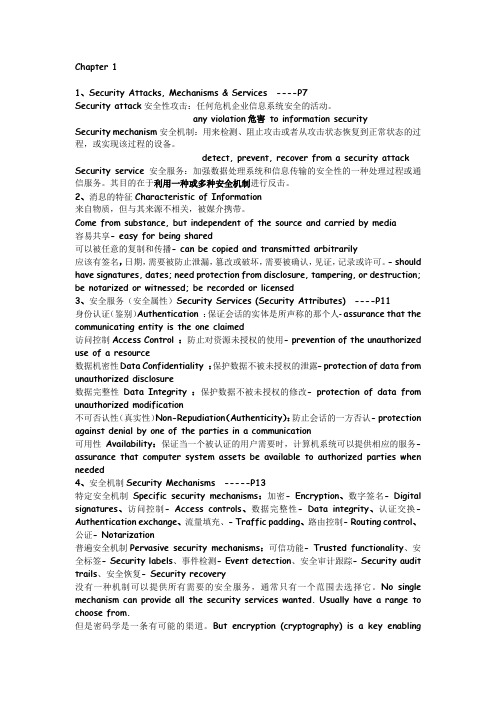
1、Security Attacks, Mechanisms & Services ----P7Security attack安全性攻击:任何危机企业信息系统安全的活动。
any violation危害 to information securitySecurity mechanism安全机制:用来检测、阻止攻击或者从攻击状态恢复到正常状态的过程,或实现该过程的设备。
detect, prevent, recover from a security attack Security service安全服务:加强数据处理系统和信息传输的安全性的一种处理过程或通信服务。
其目的在于利用一种或多种安全机制进行反击。
2、消息的特征Characteristic of Information来自物质,但与其来源不相关,被媒介携带。
Come from substance, but independent of the source and carried by media容易共享- easy for being shared可以被任意的复制和传播- can be copied and transmitted arbitrarily应该有签名,日期,需要被防止泄漏,篡改或破坏,需要被确认,见证,记录或许可。
- should have signatures, dates; need protection from disclosure, tampering, or destruction; be notarized or witnessed; be recorded or licensed3、安全服务(安全属性)Security Services (Security Attributes) ----P11身份认证(鉴别)Authentication:保证会话的实体是所声称的那个人- assurance that the communicating entity is the one claimed访问控制Access Control :防止对资源未授权的使用- prevention of the unauthorized use of a resource数据机密性Data Confidentiality :保护数据不被未授权的泄露–protection of data from unauthorized disclosure数据完整性Data Integrity :保护数据不被未授权的修改- protection of data from unauthorized modification不可否认性(真实性)Non-Repudiation(Authenticity):防止会话的一方否认- protection against denial by one of the parties in a communication可用性Availability:保证当一个被认证的用户需要时,计算机系统可以提供相应的服务- assurance that computer system assets be available to authorized parties when needed4、安全机制Security Mechanisms -----P13特定安全机制Specific security mechanisms:加密- Encryption、数字签名- Digital signatures、访问控制- Access controls、数据完整性- Data integrity、认证交换- Authentication exchange、流量填充、- Traffic padding、路由控制- Routing control、公证- Notarization普遍安全机制Pervasive security mechanisms:可信功能- Trusted functionality、安全标签- Security labels、事件检测- Event detection、安全审计跟踪- Security audit trails、安全恢复- Security recovery没有一种机制可以提供所有需要的安全服务,通常只有一个范围去选择它。
Chapter One-汉+英
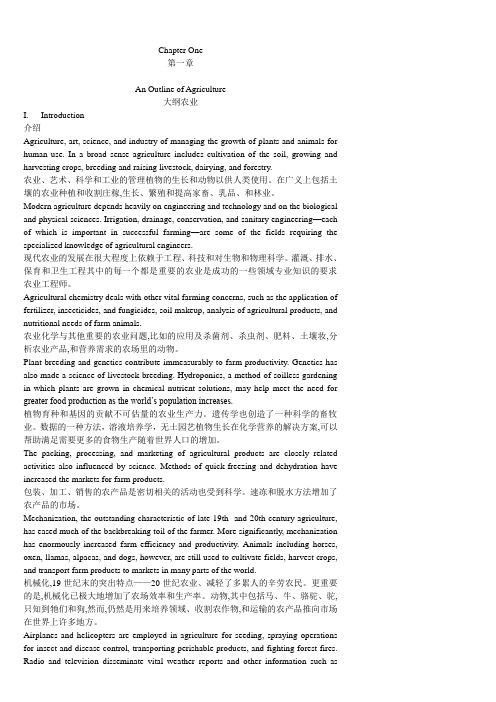
Chapter One第一章An Outline of Agriculture大纲农业I. Introduction介绍Agriculture, art, science, and industry of managing the growth of plants and animals for human use. In a broad sense agriculture includes cultivation of the soil, growing and harvesting crops, breeding and raising livestock, dairying, and forestry.农业、艺术、科学和工业的管理植物的生长和动物以供人类使用。
在广义上包括土壤的农业种植和收割庄稼,生长、繁殖和提高家畜、乳品、和林业。
Modern agriculture depends heavily on engineering and technology and on the biological and physical sciences. Irrigation, drainage, conservation, and sanitary engineering—each of which is important in successful farming—are some of the fields requiring the specialized knowledge of agricultural engineers.现代农业的发展在很大程度上依赖于工程、科技和对生物和物理科学。
灌溉、排水、保育和卫生工程其中的每一个都是重要的农业是成功的一些领域专业知识的要求农业工程师。
Agricultural chemistry deals with other vital farming concerns, such as the application of fertilizer, insecticides, and fungicides, soil makeup, analysis of agricultural products, and nutritional needs of farm animals.农业化学与其他重要的农业问题,比如的应用及杀菌剂、杀虫剂、肥料、土壤妆,分析农业产品,和营养需求的农场里的动物。
英汉互译课件 第一讲:翻译标准
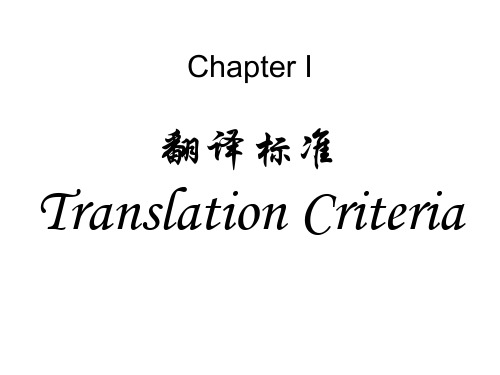
【例11】We shall go on to the end, we shall fight in France, we shall fight on the seas and oceans, we shall fight with growing confidence and growing strength in the air, we shall defend on the beaches, we shall fight on the landing grounds, we shall fight in the fields and in the streets, we shall fight in the hills… 【译文】我们将坚持到最后,我们将在法国国土上作战,将在各 处海洋上作战,我们的空中力量将越战越有信心,越战越 强;我们将在滩头作战,在敌人登陆地作战,在乡村田 野、城市街头作战,我们将在群山中作战……
【例 3】 He Who keeps company with the wolf will learn to howl. 【译文1】 近朱者赤,近墨者黑。 【译文2】 与狼做伴,就要学会狼嚎。
【例 4】The time will come when the diesel engine will go out of use and the nuclear engine will be substituted for it. 【译文1】 柴油引擎被淘汰,使用核引擎的时候即将来临。 【译文2】 总有一天,柴油机会受到淘汰,而代之以核发动机。 【例 5】The Agreement is executed in Chinese. If necessary, it may be translated into English. 【译文1】 本协议以中文签署。需要时,可译成英文。 【译文2】 本协议签署的文本是中文文本。需要时,可译成英 文。
会计英语 翻译chapter1

Chapter one Introduction to Accounting 1.1 Bookkeeping and AccountingAccounting is an information system that identifies,measures,records and communicates relevant,reliable,consistent,and comparable information about an organization’s economic activity. Its objective is to help people make better decisions.An understanding of the principles of bookkeeping and accounting is essential for anyone who is interested in a successful career in business. The purpose of bookkeeping and accounting is to provide information concerning the financial affairs of a business. Owners, managers, creditors, and governmental agencies need this information.An individual who earns living by recording the financial activities of business is known as a bookkeeper, while the process of classifying and summarizing business transactions and interpreting their effects is accomplished by an accountant. Accountant is the individual who understands the accounting principles, theoretical and practical application, and can manage, analyze, and interpret the accounting records. The bookkeeper is concerned with techniques involving the recording of transactions, and the accountant’s objective is the use of data for interpretation.第一章['tʃæptə]会计导论[.intrə'dʌkʃən]1.1 簿记与会计会计是一个信息系统,[ai'dentəfai]辨别、['meʒəz]测量、记录和交流相关的['reləvənt]、可靠的[ri'laiəbl]、持续的[kən'sistənt]和可比的['kɔmpərəbl]一个组织经济活动的信息。
现代大学英语精读1课本内容及翻译
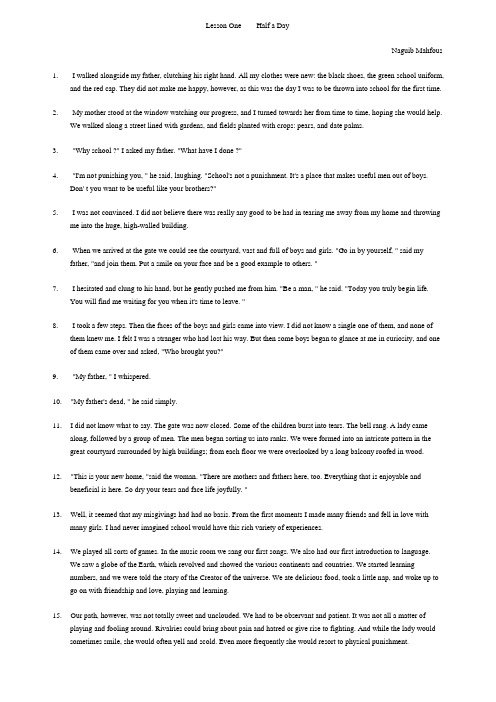
Lesson One Half a DayNaguib Mahfous1. I walked alongside my father, clutching his right hand. All my clothes were new: the black shoes, the green school uniform,and the red cap. They did not make me happy, however, as this was the day I was to be thrown into school for the first time.2. My mother stood at the window watching our progress, and I turned towards her from time to time, hoping she would help.We walked along a street lined with gardens, and fields planted with crops: pears, and date palms.3. "Why school ?" I asked my father. "What have I done ?"4. "I'm not punishing you, " he said, laughing. "School's not a punishment. It's a place that makes useful men out of boys.Don' t you want to be useful like your brothers?"5. I was not convinced. I did not believe there was really any good to be had in tearing me away from my home and throwingme into the huge, high-walled building.6. When we arrived at the gate we could see the courtyard, vast and full of boys and girls. "Go in by yourself, " said myfather, "and join them. Put a smile on your face and be a good example to others. "7. I hesitated and clung to his hand, but he gently pushed me from him. "Be a man, " he said. "Today you truly begin life.You will find me waiting for you when it's time to leave. "8. I took a few steps. Then the faces of the boys and girls came into view. I did not know a single one of them, and none ofthem knew me. I felt I was a stranger who had lost his way. But then some boys began to glance at me in curiosity, and one of them came over and asked, "Who brought you?"9. "My father, " I whispered.10. "My father's dead, " he said simply.11. I did not know what to say. The gate was now closed. Some of the children burst into tears. The bell rang. A lady camealong, followed by a group of men. The men began sorting us into ranks. We were formed into an intricate pattern in the great courtyard surrounded by high buildings; from each floor we were overlooked by a long balcony roofed in wood.12. "This is your new home, "said the woman. "There are mothers and fathers here, too. Everything that is enjoyable andbeneficial is here. So dry your tears and face life joyfully. "13. Well, it seemed that my misgivings had had no basis. From the first moments I made many friends and fell in love withmany girls. I had never imagined school would have this rich variety of experiences.14. We played all sorts of games. In the music room we sang our first songs. We also had our first introduction to language.We saw a globe of the Earth, which revolved and showed the various continents and countries. We started learningnumbers, and we were told the story of the Creator of the universe. We ate delicious food, took a little nap, and woke up to go on with friendship and love, playing and learning.15. Our path, however, was not totally sweet and unclouded. We had to be observant and patient. It was not all a matter ofplaying and fooling around. Rivalries could bring about pain and hatred or give rise to fighting. And while the lady would sometimes smile, she would often yell and scold. Even more frequently she would resort to physical punishment.16. In addition, the time for changing one' s mind was over and gone and there was no question of ever returning to theparadise of home. Nothing lay ahead of us but exertion, struggle, and perseverance. Those who were able took advantage of the opportunities for success and happiness that presented themselves.17. The bell rang, announcing the passing of the day and the end of work. The children rushed toward the gate, which wasopened again. I said goodbye to friends and sweethearts and passed through the gate. I looked around but found no trace of my father, who had promised to be there. I stepped aside to wait. When I had waited for a long time in vain, I decided to return home on my own. I walked a few steps, then came to a startled halt. Good Lord! Where was the street lined with gardens? Where had it disappeared to? When did all these cars invade it? And when did all these people come to rest on its surface? How did these hills of rubbish find their way to cover its sides? And where were the fields that bordered it? High buildings had taken over, the street was full of children, and disturbing noises shook the air. Here and there stood conjurers showing off their tricks or making snakes appear from baskets. Then there was a band announcing the opening of a circus, with clowns and weight lifters walking in front.18. Good God! I was in a daze. My head spun. I almost went crazy. How could all this have happened in half a day, betweenearly morning and sunset? I would find the answer at home with my father. But where was my home? I hurried towards the crossroads, because I remembered that I had to cross the street to reach our house, but the stream of cars would not let up.Extremely irritated, I wondered when I would be able to cross.19. I stood there a long time, until the young boy employed at the ironing shop on the corner came up to me.20. He stretched out his arm and said, "Grandpa, let me take you across."第一课半日1我走在父亲的一侧,牢牢地抓着他的右手。
翻译概论Chapter1-2从翻译的比喻认识翻译的本质及翻译的原则

Chapter1----从翻译的比喻认识翻译的本质1.第一章内容概述1)翻译的重要性(对翻译和翻译家的种种比喻):普希金------“人类精神的传递者。
”歌德------“世界上全部交际来往中最重要、最高贵的事业之一。
”理查兹------“整个宇宙中最为复杂的活动之一”人类自有语言交流以来,翻译活动也就一直相伴相随。
翻译不仅使得人类各种语言与文化之间的沟通成为可能,而且还帮助推动人类社会不断向文明的更高阶段发展。
2)从对翻译或翻译者的宏观比喻来看翻译的本质(1)对翻译或者翻译者总体或宏观的比喻;歌德------翻译家应是“忙碌的媒人”钱钟书------将翻译比作“做媒”《翻译、历史与文化》------把翻译比作婚姻翻译者还被比喻成“像一位雕塑家,用雕塑再现油画作品的形象”,也是“珍宝的发现者”或是“掘金者”。
在西方,翻译家数百年来也把自己的工作比喻成“把一个酒瓶里的酒倒到另一个酒瓶里去”,翻译并不是简简单单“倒酒”的机械动作,而是一个需要翻译者在艺术上有所倾注的复杂微妙的过程。
(2)从对翻译操作过程的比喻来看翻译的本质①把翻译比作渡河——船是要翻译的文本,领航者是翻译者,渡河的行程便是翻译的过程,河的两岸分别就是原语与译入语的文化。
②美国翻译家Margaret Sayers Peden把原作想象成一块方方正正的冰,翻译的过程就是这块冰的熔化过程。
这个比喻借用了自然科学对物质从一种状态变成另一种状态的描述,十分生动,也颇富揭示性。
③对翻译,另一种最新的、更具揭示性的比喻是“没有舞台的演出”。
④巴西翻译家——“食人者”对翻译者或者翻译的种种比喻尽管五花八门,但都有一个明显的特征,即它们基本上都是正面的,都包含对翻译者工作的褒扬,是确实还有少数比喻表达了对翻译或翻译者的否定或批评;如“翻译即背叛者等”。
2)翻译的本质翻译是一种文化传播的工具,在国与国之间、原语文化与译入语文化之间起着桥梁和纽带的作用;翻译不仅仅是文本从一种语言向另一种语言的过渡,也是文本之间、文化之间的一种协商过程,是以翻译者为中间人进行交流和斡旋的过程;翻译不仅仅是一门涉及语符转换、意义传递的技巧或技艺,更是一项极富创造性、挑战性的活动,是“一种艺术,一种需要译者像画家、表演家”那样具有高超创作才能的艺术。
公司简介翻译
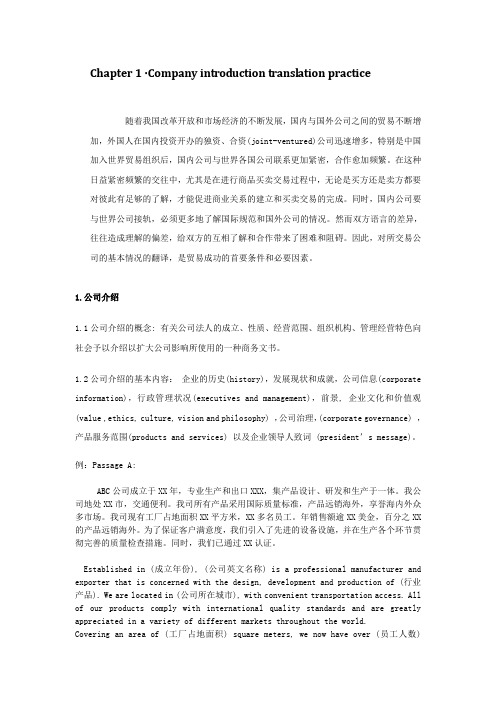
Chapter 1 ·Company introduction translation practice随着我国改革开放和市场经济的不断发展,国内与国外公司之间的贸易不断增加,外国人在国内投资开办的独资、合资(joint-ventured)公司迅速增多,特别是中国加入世界贸易组织后,国内公司与世界各国公司联系更加紧密,合作愈加频繁。
在这种日益紧密频繁的交往中,尤其是在进行商品买卖交易过程中,无论是买方还是卖方都要对彼此有足够的了解,才能促进商业关系的建立和买卖交易的完成。
同时,国内公司要与世界公司接轨,必须更多地了解国际规范和国外公司的情况。
然而双方语言的差异,往往造成理解的偏差,给双方的互相了解和合作带来了困难和阻碍。
因此,对所交易公司的基本情况的翻译,是贸易成功的首要条件和必要因素。
1.公司介绍1.1公司介绍的概念: 有关公司法人的成立、性质、经营范围、组织机构、管理经营特色向社会予以介绍以扩大公司影响所使用的一种商务文书。
1.2公司介绍的基本内容:企业的历史(history),发展现状和成就,公司信息(corporate information),行政管理状况(executives and management),前景, 企业文化和价值观(value ,ethics, culture, vision and philosophy) ,公司治理,(corporate governance) ,产品服务范围(products and services) 以及企业领导人致词 (president’s message)。
例:Passage A:ABC公司成立于XX年,专业生产和出口XXX,集产品设计、研发和生产于一体。
我公司地处XX市,交通便利。
我司所有产品采用国际质量标准,产品远销海外,享誉海内外众多市场。
我司现有工厂占地面积XX平方米,XX多名员工。
年销售额逾XX美金,百分之XX 的产品远销海外。
大学英汉互译 第一章 unit1 General Principels

寻寻觅觅,冷冷清清,凄凄惨惨戚戚。 (李清照:《声声慢》) I look for what I miss, I know not what it is. I feel so sad, so drear, So lonely, without cheer. (许渊冲 译)
翻译是以符号转换为手段,意义再生为任务的一项跨文 化的交际活动。(许钧,2003)
Translation is the replacement of textual material in one language (SL) by equivalent textual material in another language (TL). (Catford,1965) 翻译的定义也可以这样说:把一种语言(SL)中的篇章 材料用另一种语言(TL)中的篇章材料来加以代替。 (卡特福德) (A Linguistic Theory of Translation, 1965)
Poem is what is lost in translation.
琵琶琴瑟,八大王王王在上。 魑魅魍魉,四小鬼鬼鬼犯边。
It is difficult and even impossible to translate such cultural items. Translation is the most complicated human activity.
翻译是将一种文字之真义全部移至另一种文字而绝不失 其风格的神韵。(吴献书,1949) 翻译是用一种语言把另一种语言所表达的思维内容准确 而完整地重新表达出来的语言活动。(张培基,1980) 翻译的实质是语际的意义转换。(刘宓庆,1990)
chapterone汉译英概述.ppt

1.1.3. 翻译的方法
直 译 literal translation vs. 意 译 free translation
归化 domestication Vs.异化 foreignization
直译 literal translation vs.意译free translation
▪直译
▪语言层面
English Language: to turn into one’s own or another language(转换成本族语或另一种语言)。 ▪ 翻译是一种“语言转换”活动。
Alexander Fraser Tytler:
A good translation is one which the merit of the original work is so completely transfused into another language as to be as distinctly apprehended and as strongly felt by a native of the country to which that language belongs as it is by those who speak the language of the original work.
1.1. 翻译的性质和类型
▪ 1.1.1. 翻译的定义 ▪ 1.1.2. 翻译的类型 ▪ 1.1.3. 翻译的方法
1.1.1. 翻译的定义
▪ The Oxford English Dictionary: to turn from one language into another
▪ (从一种语言转换成另一种语言); ▪ Webster’s third New International Dictionary of the
Chapter 1工程英语翻译概述

通顺是指译文语言要符合规范,行文通顺。要力争 做到忠实与通顺的辩正统一。
一方面要防止对忠实的片面理解,一味追求形式上 的相似,造成逐字死译。另一方面又要防片面强调 “通顺”,而不忠实于原文。
工程英语注重逻辑性,因此分词连接成分 (Participle Connectors) 的使用率很高, 例如:
Supposing that …假定、假设 Assuming that …假定、假设 Provided that …倘若、只要 Seeing that …由于、鉴于
3. 透彻分析深层结构
Examples:
1.Progress control is obtained by comparing actual performance on the work against the desired performance set up on the master or detailed schedules. 进度控制是通过比较工程实际进度与主要(或详细) 进度表中确定的预期进度来进行的。
工程英语翻译
第一章 工程英语翻译概述
Warm-up Exercise
Placing is the process of transferring the fresh concrete from the conveying device to its final place in the forms. Prior to placing, loose rust must be removed from reinforcement, forms must be cleaned, and hardened surfaces of previous concrete lifts must be cleaned and treated appropriately. Placing and compacting are critical in their effect on the final quality of the concrete. Proper placement must avoid segregation, displacement of forms or of reinforcement in the forms, and poor bond between successive layers of concrete.
chapter1 概述

JAVA线程执行中被映射到实际的操作系统线程。
1.2Java的特点-动态
JAVA程序的基本组成单元--类是运行时 动态装载的。使 JAVA 可以动态地维护应用 系统及其支持类之间的一致性。
1.2Java的特点- 高性能
Java编译生成的字节码与机器代码 十分接近。 提供即时编译(Just In Time) 等 措施。
1995年 以James Gosling为首的编程小组在wicked. 网站 上发布了Java技术,Java语言的名字从"Oak"变为Java,Java 技术通过Sun world正式发布 1996年 第一次举办JavaOne 开发者大会 , JDK 1.0 软件发布 计算机深蓝色首次击败国际象棋大师Garry Kasparov
满足面向对象的封装要求;
支持继承;
通过抽象类与接口支持多态
1.2Java的特点-分布式
数据分布支持:
通过Java的URL类可以访问网上的各类信 息资源,访问方式完全类似于本地文件系统;
操作分布支持。
通过在3W页面中的小应用程序(Applet) 将计算从服务器分布至客户机,避免网络拥挤, 提高系统效率。
一门专业核心基础课
在计算机程序开发语言中,windows平台下Java和.net平分 秋色,但在非windows平台下,Java占据绝对的领导地位。 Java是计算机及其相关专业的核心基础课程,是软件工程师 应该真正掌握住的一门技术,尤其是在Web开发和移动开发 领域,Java已经成了事实上的企业应用标准。
1.2Java的特点-半编译,半解释
JAVA源程序
编译器 编译
字节码
解释器 解释执行
chapter 翻译
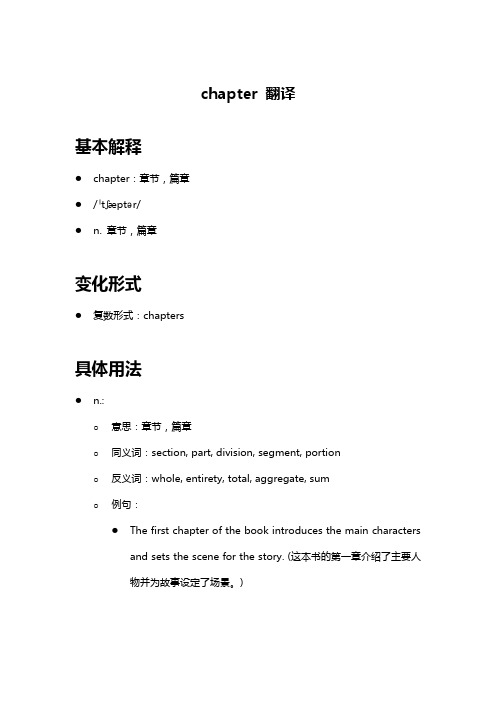
chapter 翻译基本解释●chapter:章节,篇章●/ˈtʃæptər/●n. 章节,篇章变化形式●复数形式:chapters具体用法●n.:o意思:章节,篇章o同义词:section, part, division, segment, portiono反义词:whole, entirety, total, aggregate, sumo例句:●The first chapter of the book introduces the main charactersand sets the scene for the story. (这本书的第一章介绍了主要人物并为故事设定了场景。
)●Each chapter in the textbook covers a different aspect of thesubject matter, providing a comprehensive understanding.(教科书中的每一章都涵盖了主题的不同方面,提供了全面的理解。
)●The final chapter of the novel brings all the plot threadstogether in a satisfying conclusion. (小说的最后一章将所有情节线索汇聚在一起,形成一个令人满意的结局。
)●In the history of the company, this year marks a new chapterwith the launch of innovative products. (在公司的历史中,今年标志着一个新篇章,推出了创新产品。
)●The chapter on climate change in the report highlights theurgent need for global action. (报告中关于气候变化的章节强调了全球行动的紧迫性。
chapter_1_简介和翻译标准

大家被淋得浑身透湿,他们头天晚上还是聚到了 一起。
• 2) 具有丰富的文化知识,熟悉以英语为母 语的国家的诸如历史、宗教、政治、地理、 军事、外交、经济、文艺、科学、风土人 情、民俗习惯等方面的社会文化。这有助 于正确理解原文,完美地表达原作所要传 达的思想内容。 • 3) 熟悉翻译理论和常用技巧,善于灵活运 用各种翻译技巧。 • 4) 熟悉各种工具书。
翻译的规律难以译出原文的言外之意。 翻译的规律难以译出原文的言外之意。许多句子的真正 意义在言外。言外之意是语言的内涵, 意义在言外。言外之意是语言的内涵,译者能译出语言内涵 的翻译技能就是其翻译的艺术性。 的翻译技能就是其翻译的艺术性。 • Are you an associate professor now ?
英汉翻译的标准: 英汉翻译的标准 Pp8-10
• • • • • •
唐朝,玄奘 清末,严复 鲁迅 傅雷 梁实秋 钱钟书
• 1 faithfulness, expressiveness, elegance • 2 rather faithful than smooth • 3 spiritual conformity • 4 rather smooth than faithful • 5 sublimed adaptation • 6 faithfulness and readability (求真 喻俗)
Connotation of Translation
• Is translation an art, a science, or a craft? • ...translation is first a science, which entails the knowledge and verification of the facts and the language that describes them-here, what is wrong, mistakes of truth, can be identified; secondly, it is a skill, which calls for appropriate language and acceptable usage; thirdly, an art, which distinguishes good from undistinguished writing and is the creative, the intuitive, sometimes the inspired, level of the translation; … (Peter Newmark)
翻译入门(选修)Chapter 1

任课教师:杨炳钧 ywilson@
注:部分参照 程永生 课件制作
Warming-up exercises
• (1)To say of what is not, or of what is not is false, while to say that it is, or of what it is not, is true. that it is that it is, of what is is not that
• 把事实如此说成并非如此,或把并非如此 说成事实如此,即为“假”;把事实如此 说成事实如此,或把并非如此说成并非如 此,即为“真”。
• (2)知彼知己,百战不殆;不知 彼知己,一胜一负;不知彼不知己, 每战必殆。
• You can fight many battles without defeat if you know your enemy and yourself as well; you will win half the battle if you know yourself but your enemy; and you will lose all the battles if you know little about yourself and your enemy.
第一部分 课程说明
1、教材与参考资料
• 课程教材:
–陈文伯,《译艺:英汉汉英双向笔译》。北京:世界 知识出版社,2004。
• 主要参考资料:
–[1] 刘宓庆,《翻译教学:实务与理论》。北京:中 国对外翻译出版公司,2006。 –[2] Munday, Jeremy. Introducing Translation Studies—Theories and Applications. London and New York: Routledge, 2001.
新英汉翻译课件教程 Chapter 1 翻译概论

• Contrast is the spice of life. There can
be no joy without sorrow, no summer without winter, no love without hate. • 【译文】矛盾是生活的调味品:没有悲伤就 没有快乐;没有冬就没有夏;没有恨就没有 爱。 • 【解析】充满哲理,令人信服。译文和原文 一样挥洒自如,如歌似曲。
课堂互动 1:找找哪个译文正确
• 1.He has a weakness for smoking.
•
– A.他有抽烟的缺点。 – B.他有抽烟的癖好。 2.A cat is a cleanly animal. – A.猫是一种干净的动物。 – B.猫是喜爱清洁的动物。
• 3.He is dead,as I live.
•
钱钟书提出文学翻译的最高标准是“化”。把作 品从一国文字转变为另一国文字,既不能因语 言习惯的差异而露出生硬牵强的痕迹,又能完 全保存原有的风味,那就算得上是入于“化” 境了。 谭载喜提出了翻译的“东张西望”法和译学内 容的“瞻前顾后”法。“东张”即发挥自身的 语言优势,做到译文的“信达贴”、“信达 切”、“神似”、“化境”。“西望”则是借 鉴西方译论,立足分析,注重理论,放眼系统。 “瞻前”——放开思路,大胆开拓;“顾 后”——继承传统,推陈出新。
黄昏的阴影几乎连在一起,不可分别,岁将云暮,终日昏 暗,我就在这么一天,到西敏大寺去散步了几个钟头。 • 【解析】此译文对原文语序略作调整,译文表达忠实、正 确、流畅,符合汉语习惯。但现代人读来文字华丽、感到 过于学究气,和原语文本中所用文字和所表达语气似乎相 悖。 • 【译文】时值晚秋,天气肃杀凄凉,令人伤感,晨日的光 影与黄昏的光影几乎交织在一起,难以分辨,昏暗的光线 投射到一年的衰败秋日之中,而就在这样的一天,我独自 到西敏寺大教堂散步了几个小时。
《小王子》原著英汉对照chapter1
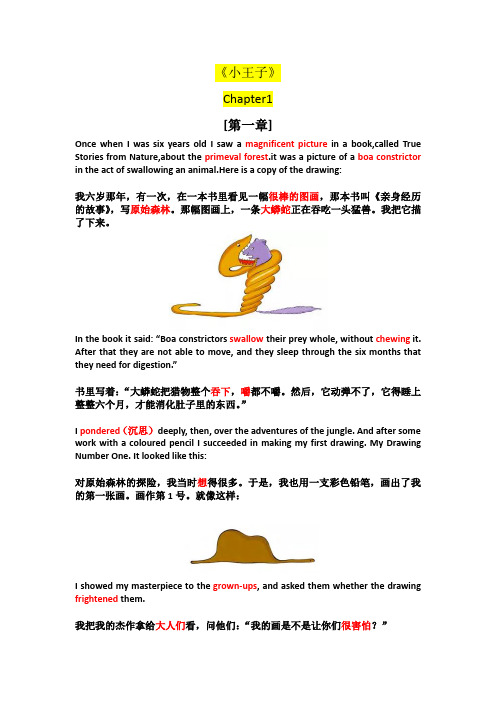
《小王子》Chapter1[第一章]Once when I was six years old I saw a magnificent picture in a book,called True Stories from Nature,about the primeval forest.it was a picture of a boa constrictor in the act of swallowing an animal.Here is a copy of the drawing:我六岁那年,有一次,在一本书里看见一幅很棒的图画,那本书叫《亲身经历的故事》,写原始森林。
那幅图画上,一条大蟒蛇正在吞吃一头猛兽。
我把它描了下来。
In the book it said: “Boa constrictors swallow their prey whole, without chewing it. After that they are not able to move, and they sleep through the six months that they need for digestion.”书里写着:“大蟒蛇把猎物整个吞下,嚼都不嚼。
然后,它动弹不了,它得睡上整整六个月,才能消化肚子里的东西。
”I pondered(沉思)deeply, then, over the adventures of the jungle. And after some work with a coloured pencil I succeeded in making my first drawing. My Drawing Number One. It looked like this:对原始森林的探险,我当时想得很多。
于是,我也用一支彩色铅笔,画出了我的第一张画。
画作第1号。
就像这样:I showed my masterpiece to the grown-ups, and asked them whether the drawing frightened them.我把我的杰作拿给大人们看,问他们:“我的画是不是让你们很害怕?”But they answered: “Frighten? Why should anyone be frightened by a hat?”他们回答:“一顶帽子有什么好怕的?”My drawing was not a picture of a hat. It was a picture of a boa constrictor digesting an elephant. But since the grown-ups were not able to understand it, I made another drawing. I drew the inside of the boa constrictor, so that the grown-ups could see it clearly. They always need to have things explained. My Drawing Number Two looked like this:可我画的不是帽子呀。
